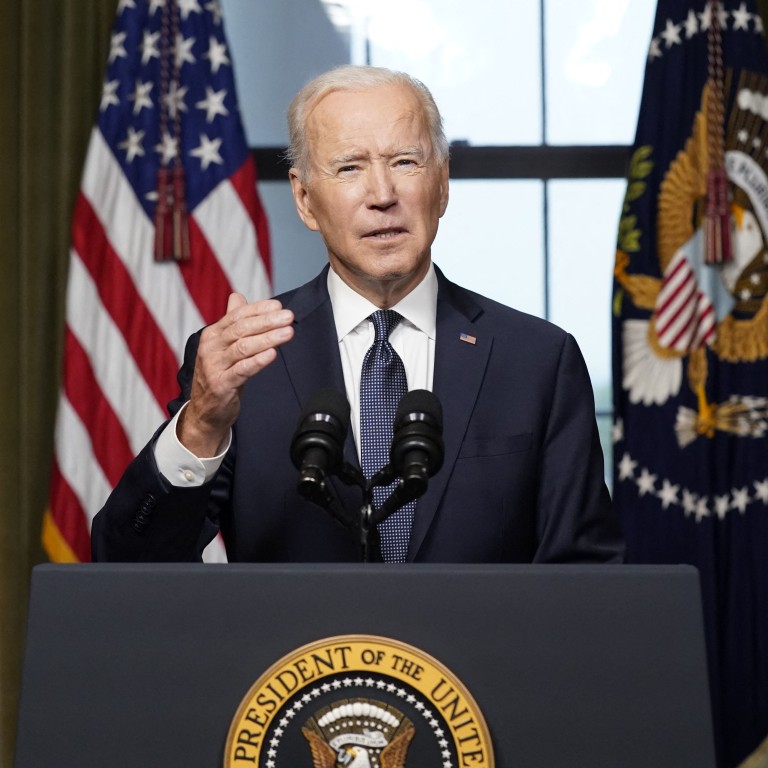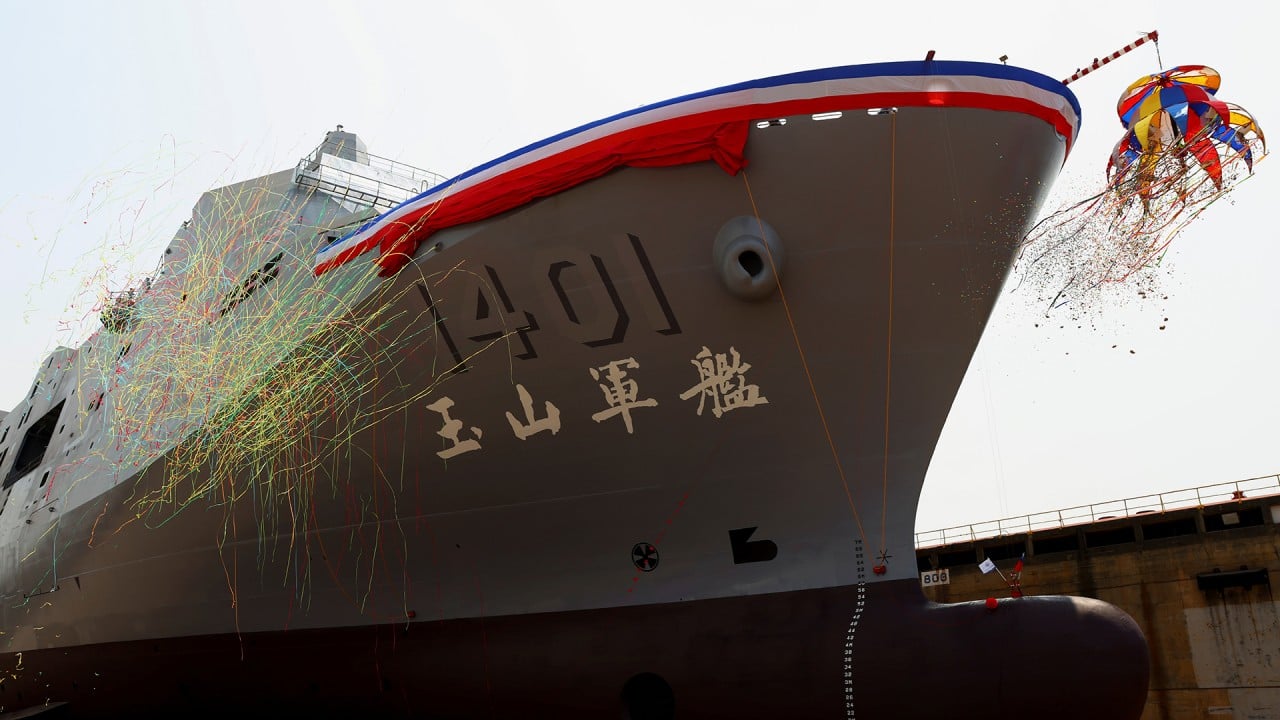
Is Joe Biden set to end the guessing game about what US will do if Taiwan is invaded?
- US policy has been to keep Beijing uncertain about its intentions, but there is a growing debate about whether it is better to send a clear warning
- New administration in Washington has shown its support for Taipei as relations with China continue to deteriorate
The Biden administration’s displays of support for Taiwan have led many to wonder if the decades-old policy of strategic ambiguity is coming to an end.
But observers said that while the Biden administration might want to deepen its relations with Taipei, there is no indication of a more fundamental shift and it is still trying not to provoke Beijing when it comes to the sensitive issue of mobilising troops to defend Taiwan.
On Wednesday, Biden sent his long-time friend and former US senator Chris Dodd to Taiwan for a three-day “unofficial” visit, during which he relayed the US president’s concerns over security in the Taiwan Strait and reaffirmed the Biden administration’s support for the island.
China accuses US and Japan of sowing division after Biden and Suga vow to counter ‘intimidation’
Later that week, Biden and Japanese Prime Minister Yoshihide Suga issued a joint statement following their meeting in Washington that included a call for peace and stability in the Taiwan Strait and encouraged the peaceful resolution of cross-strait problems.
Dodd’s trip also came just days after the Biden administration announced on April 9 that it had issued new guidelines to “liberalise” government interactions with Taiwanese officials, a move designed to encourage engagement between the two sides and “reflect our deepening unofficial relationship.”
Under the guidelines, details of which were not made public, US officials will be able to meet their Taiwanese counterparts in US federal government buildings and at Taiwan’s de facto embassy and consulates.
Strategic ambiguity is designed to maintain a careful balance in US policy towards Taiwan.
While it does not want to provoke Beijing or encourage Taiwan to declare independence, a move that could lead to military conflict, the US has not stated whether it would send troops to defend Taiwan in the event of an attack by mainland China - creating extra uncertainty for Beijing when weighing the risks of an invasion.
There has been a debate in the US over whether Washington should end the ambiguity to send a clear warning to Beijing.
The Biden administration’s actions, including last month’s coastguard cooperation agreement with Taiwan and, most significantly, the new diplomatic guidelines, have led people to believe that the Biden administration is moving away from strategic ambiguity.
Was China’s military modernisation driven by its ‘humiliation’ in 1996?
The guidelines – which carry diplomatic significance - have altered protocols in place since Washington switched recognition to Beijing from Taipei in 1979.
The changes were hailed by the Taiwanese government as a sure sign of the Biden administration’s strong support for Taiwan, which Beijing regards as part of its territory and has vowed to reunite with the mainland, by force if necessary.
According to Alexander Huang Chieh-cheng, a former vice chairman of the Mainland Affairs Council who used to work at Taiwan’s representative office in the US, the de facto embassy, no official contacts or symbols of statehood have been allowed since 1979.
All bilateral exchanges must be made through unofficial proxies – the American Institute in Taiwan which represents Washington and the Coordination Council for North American Affairs which was renamed Taiwan Council for US Affairs in 2019 - said Huang, now a professor of international relations and strategic studies at Tamkang University in Taipei.
But over the years, restrictions on government contacts have been eased on a case-by-case fashion basis until former secretary of state Mike Pompeo lifted what he called self-imposed restrictions on government contacts between the two sides in January, Huang said.
The latest guidelines dealt a strong blow to Beijing as the Biden administration was originally thought to be less supportive of Taiwan than the Trump administration.
Like its predecessor, the Biden administration continues to see Taiwan as a useful card and partner to check Beijing’s expansion, Huang said, but noted there is still a difference between the two over their approach to Taiwan.
“While Trump might have seen and used Taiwan as a ‘spearhead’ to antagonise Beijing and did not mind worsening the cross-strait situation, Biden may see Taiwan as a ‘shield’ to help defend US interests,” Huang said.
Huang said that regardless of whether the White House is moving away from strategic ambiguity, other aspects of its relations with Beijing and Taipei would remain ambiguous.
“Biden’s new guidelines clarify that Washington will continue to honour its own one-China policy and the new guidelines will not allow anything related to formats or symbols of an ‘official’ relationship with Taiwan,” Huang stressed.
The State Department says the guidelines still ban officials from attending Taiwan’s Double 10th holiday and events which assert Taiwanese sovereignty.
Exchanges by senior officials such as presidents, vice-presidents and high-ranking government ministers are not covered by the guidelines.
The State Department said the guidelines are “consistent with our unofficial relations and provide clarity throughout the executive branch on the effective implementation of our ‘one China’ policy, which is guided by the Taiwan Relations Act, the Three Joint Communiques, and the Six Assurances.”
The Taiwan Relations Act was instituted to maintain substantive ties with Taiwan and supply it with defensive weapons in the face of the mainland’s military threats after Washington established formal ties with the mainland in 1979.
The three communiques were signed by Washington and Beijing to ensure that the US recognised the communist government as the sole representative of China.
The Six Assurances underscore the US commitments to Taiwan, including not consulting Beijing about supplying arms to Taiwan.
Li Da-jung, a professor of international relations and strategic studies from Tamkang University, said the visit by Dodd, the coastguard agreement and the guidelines were all carefully planned to avoid actually crossing Beijing’s red lines.
For instance, the visit by Dodd, who has retired from the Senate, was “unofficial”, according to the State Department’s guidelines.
“Even though both the US and Japan underscored the importance of peace and stability across the Taiwan Strait during Friday’s summit, Biden stopped short of saying the US would send forces to help Taiwan in the event of a mainland attack. Suga also did not mention anything like having Japan reinforce the US in its defence of Taiwan,” Li said.


